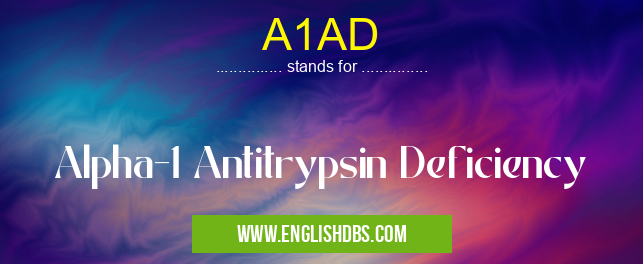What does A1AD mean in PHYSIOLOGY
Alpha-1 Antitrypsin Deficiency (A1AD) is a rare genetic disorder that affects the lungs and liver. It is caused by the production of an altered form of the alpha-1 protein, which helps protect the body from harmful enzymes in the blood. People with A1AD may experience difficulty breathing, asthma, lung disease, and liver disease. A diagnosis of A1AD can be made through genetic testing. Treatment for A1AD includes lifestyle changes, medications, and organ transplants in some cases.

A1AD meaning in Physiology in Medical
A1AD mostly used in an acronym Physiology in Category Medical that means Alpha-1 Antitrypsin Deficiency
Shorthand: A1AD,
Full Form: Alpha-1 Antitrypsin Deficiency
For more information of "Alpha-1 Antitrypsin Deficiency", see the section below.
» Medical » Physiology
Symptoms
People with A1AD may experience difficulty breathing due to impaired pulmonary function, asthma attacks, lung disease such as chronic bronchitis or emphysema, and/or liver disease such as cirrhosis or liver failure. Other potential symptoms include abdominal pain, fatigue, jaundice (yellowing of skin), and joint pain. Symptoms can vary depending on the type and severity of A1AD in any given individual.
Diagnosis
A diagnosis of A1AD can be made through genetic testing which looks for mutations in several genes associated with this condition. Blood tests can also be used to measure levels of alpha-protein in order to diagnose A1AD if it is suspected based on symptoms or family history.
Treatment
Treatment for Alpha-1 Antitypsin Deficiency usually involves lifestyle changes combined with medication management depending on the individual's condition and needs. Medications may include antibiotics for infections like bronchitis as well as inhalers to help manage respiratory symptoms like asthma attacks associated with A1AD. In some severe cases where lung or liver damage has occurred organ transplants may be necessary for recovery from this condition; however this option should only be pursued when other treatments have proven ineffective.
Essential Questions and Answers on Alpha-1 Antitrypsin Deficiency in "MEDICAL»PHYSIOLOGY"
What is Alpha-1 Antitrypsin Deficiency?
Alpha-1 Antitrypsin Deficiency (A1AD) is an inherited disorder in which a person does not produce enough alpha-1 antitrypsin (AAT), a protein that protects the lungs from inflammation and damage. It can lead to lung disease and, less commonly, liver disease.
How is Alpha-1 Antitrypsin Deficiency inherited?
A1AD is inherited in an autosomal codominant pattern, meaning both parents must pass on a defective gene for their child to be affected by the condition. It affects both men and women equally.
What are the symptoms of Alpha-1 Antitrypsin Deficiency?
Symptoms vary depending on whether or not the condition has caused lung or liver disease. The most common symptom of A1AD related lung problems are shortness of breath, wheezing, coughing up mucus/phlegm, fatigue during physical activities, chest tightness and recurring respiratory infections. While common symptoms of A1AD related liver problems are jaundice (yellowish discoloration of eyes and skin), dark urine, pale stools, fever/chills etc.
Who is at risk for developing Alpha-1 Antitrypsin Deficiency?
Anyone with a family history of A1AD may be at risk for developing the condition. Those who smoke or have been exposed to pollutants such as asbestos or other air contaminants may also be at higher risk due to increased lung damage from these agents.
How is Alpha-1 Antitrypsin Deficiency Diagnosed?
A blood test can measure levels of alpha 1 antitrypsin in the body and determine if there could be any deficiencies. In some cases additional testing may also be required in order to diagnose accurately such as genetic testing and imaging tests like X-rays or CT scans etc.
Is Alpha-1 Antitrypsin Deficiency treatable?
Yes, treatment for this condition involves managing symptoms associated with it and preventing further progression of the disorder e.g., quitting smoking or taking medications that help reduce inflammation in your lungs & liver depending on what type of organ disease has developed as a result of AAT deficiency.
